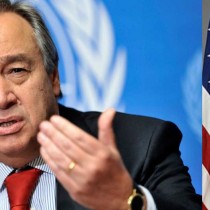ALSO IN THE NEWS

Electoral frauds in Somalia once for all - High Public expectation
Sunatimes.com - In the last few days there were shuttled diplomacy on the part of UN envoy to mediate the Somali Federal States and the Federal Government in an attempt to bring about all inclusive elections to take place in Somalia. All parties were encouraged to compromise and work effectively in implementing the September agreement.
James Swan, the special representative of the UN secretary general and head of UN Assistance Mission (UNSOM) in Somalia, had been meeting with the government and the Federal states to convince them in convening face to face meeting to reach a political agreement in all sticking points. He had also held a number of meeting with the council of the presidential candidates. They seem to be supportive his plan.
In the upcoming meeting, it is only meant to address this electoral impasse among the disputing parties by political means rather violent means and that is good and achievable objective. It is bit late but welcome. The civil society groups say that what the Somali people need from the International community is to help Somalia to build very strong democratic institutions which have its checks and balances. They say that the successive governments have not accomplished much and it is time to appraise them properly and lessons ought to be learned from their shortcomings in terms of security and other governmental functions.
The core of the dispute is relating to Federal government’s failure to make itself a genuine federal government which works with all other federal states in the country. It failed to understand that it was the mother the national unity and supposed to build federally functioning institutions for each region. Instead of that the government undermined them and resorted to control them by hand picking their elected leaders for personal aims.
Similarly, it made dysfunctional other federal government institutions by appointing incompetent and inept young officials. In some cases, the government’s little resources and international aid are used to destroy the fabric of the State. The Somalis are divided into clan lines, and the most of the time, the political power is abused to achieve some form of interest even violently. It is only fair that the officials responsible for this sort of mismanagement and power abuse ought to be held accountable.
Analyst have observed that Somali people can not tolerate any more the mismanagement of unrepresentative officials. It is not secret that the mistrust of all governments ( regional and national) among the public is growing. It is the cause of the emerging intra clan fighting in many regions. In eyes of the public, the experiences on the ground show that government officials are not meant to serve the public, but to steal the public resources and lands (private or public).
In exploring new ideas, many people think that it is about time to recognize that the system needs a complete overhauling. They say that the International Community is expected to help the civil Society groups in each community to clean up the system.
It is relevant to mention here that the Somali people are following the news of the expected regional leaders’ talks. They expect from them some good news and an action plan as it is not easy to satisfy high public expectation, when there are politicians who can not simply agree how to manage public affairs on their own competently.
To begin with the management of the upcoming election, many people think that the civil Society groups led by the Somali traditional leaders are capable of selecting competent MPs and that is the easy way to stop people buying seats or fighting over seats unnecessary.
They reckon that the selection of proper representatives in the next government from the respective constituencies is possible if the International Community to commit resources into it directly and empower civil society groups. They can be encouraged to select people on merit and that will address the root cause of electoral frauds in Somalia once for all.
The critics say that International partners are also expected to help the next government to implement the four objectives discussed in Garowe meeting and the recommendations of Heritage Institute. It is in fact a Somali owned plan. But this time, the ownership should also to be seen in practice and adequately funded. Especially, the security and the completion of the draft constitution files which are in fact the two most sensitive ones. They ought to be taken out of the hand of the bickering politicians.
This task should be given to the civil Society groups who have a real interest in public good and can make sure the job is done properly in the next term. Critics believe that in Somalia, funding projects without known owners are seen wasting resources without aim or cause. The end.
By Mohamed Mohamud Adde
The author is an academic and an Independent Somali Political Analyst who is based in Mogadishu
Leave a comment
| Copyright © 2009 - 2026 Sunatimes News Agency All Rights Reserved. |
| Home | About Us | Diinta | Reports | Latest News | Featured Items | Articles | Suna Radio | Suna TV | Contact Us |
 0
0 









Electoral frauds in Somalia once for all - High Public expectation
Sunatimes.com - In the last few days there were shuttled diplomacy on the part of UN envoy to mediate the Somali Federal States and the Federal Government in an attempt to bring about all inclusive elections to take place in Somalia. All parties w